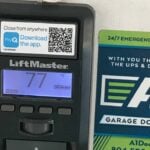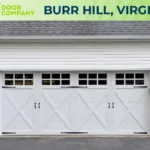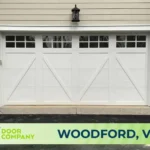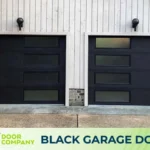
When temperatures drop in Virginia, homeowners often notice their garage doors behaving differently. From sluggish openers to stiff panels and frozen seals, winter can take a toll on your garage door system. Understanding how cold weather affects your garage door helps you prevent damage and avoid unexpected repairs during the season.
Why Garage Doors Struggle in Cold Weather
Your garage door operates through a series of mechanical and electrical components—springs, rollers, hinges, sensors, and motors—all of which are sensitive to temperature changes. When winter sets in, the combination of cold air, moisture, and metal parts can create performance issues.
Common cold-weather garage door problems include:
- The door opens or closes more slowly
- The garage door won’t open at all
- The remote or wall switch stops responding
- You hear loud squeaks or grinding noises
- The door gets stuck halfway
If you’ve noticed these signs, it’s likely your garage door or opener is reacting to the cold.
Effects of Low Temperatures on Garage Door Components
Metal Parts Contract
Metal contracts when it’s cold. Springs, tracks, and rollers can tighten up, causing friction or misalignment. This extra strain may prevent your opener from lifting the door properly—or worse, lead to a broken spring.
Thickened Lubrication
Lubricants designed for warmer months can thicken in cold weather, creating resistance. If your rollers or hinges aren’t moving smoothly, it’s time to clean off the old grease and apply a cold-weather garage door lubricant made for low temperatures.
Frozen Weather Seals
The rubber seal at the bottom of your garage door can freeze to the ground after snow or freezing rain. Forcing the door open while it’s stuck can tear the seal or strip the opener gears. To prevent this, sprinkle a little salt or use a silicone spray along the bottom edge before snow or ice hits.
Battery and Sensor Issues
Garage door openers rely on sensors and batteries that don’t perform as well in the cold. Batteries lose capacity faster in freezing temperatures, which may cause your remote or wireless keypad to stop working. Likewise, condensation or frost on safety sensors can disrupt their infrared signal, making the door refuse to close.
Insulation and Energy Efficiency Problems
A poorly insulated garage can cause your door’s internal components to cool more quickly—and your heating bills to rise. If your garage shares a wall with your home, cold air can seep indoors.
Installing an insulated garage door or adding insulation panels to your existing one can:
- Improve temperature control
- Protect springs and openers from freezing
- Reduce noise
- Increase energy efficiency
A1 Door Company offers insulated steel and carriage-style garage doors that maintain performance and comfort throughout Virginia’s winters.
Maintenance Tips for Winter Garage Door Care
Lubricate Moving Parts
Use a lithium-based or silicone spray lubricant every few months to keep your rollers, hinges, and springs working smoothly in the cold.
Check and Replace Weather Seals
Inspect the bottom and side seals for cracks or flattening. Replacing worn weather stripping prevents drafts and stops the door from freezing shut.
Clean Tracks and Sensors
Remove dirt, salt, or debris buildup that may block the tracks or photo-eye sensors. Wipe the sensors gently with a soft cloth.
Test the Door Balance
Disconnect the opener and lift the door manually. If it feels heavy or uneven, the springs may be wearing out—contact a professional before they snap.
Keep Remotes Warm
Store remote controls inside your vehicle instead of leaving them clipped near cold windows or dashboards. This helps maintain battery life and responsiveness.
When to Call a Professional
DIY fixes can help with minor issues, but if your door isn’t opening properly, it’s best to schedule a professional inspection. Attempting to repair or replace garage door springs or openers without the right tools can be dangerous.
A1 Door Company provides garage door repair, opener installation, and seasonal maintenance for homeowners throughout Richmond, Chesterfield, Midlothian, and the surrounding Virginia areas. Our certified technicians will ensure your system runs safely and efficiently, even in freezing temperatures.
Stay Ahead of the Weather
Before winter weather sets in, schedule a maintenance visit to:
- Tune up your opener and lubricate moving parts
- Adjust spring tension for temperature changes
- Inspect for rust or corrosion
- Replace worn weather seals
- Ensure safety sensors are properly aligned
Preventive care keeps your garage door reliable when you need it most—and can save you from costly emergency repairs during a cold snap.
Contact A1 Door Company for Expert Garage Door Services
Cold weather can strain your garage door and opener in many ways, from stiff springs to frozen seals. With regular maintenance, proper insulation, and timely repairs, you can keep your system running smoothly all winter long.
For expert garage door maintenance, repair, and opener service in Virginia, trust the professionals at A1 Door Company.
Cold Weather FAQs
Why won’t my garage door open in cold weather?
How do I keep my garage door from freezing shut?
Should I lubricate my garage door in the winter?
Does insulating my garage door really help in winter?
It's Easy To Book Online!
Cold Weather Garage Door Tips
Cold temperatures can cause metal garage door parts to contract, resulting in stiffness, noise, or even frozen seals that prevent smooth operation. Lubricating moving parts and checking your weather stripping before winter can help prevent seasonal damage. For expert inspection and maintenance, trust A1 Door Company to keep your garage door running smoothly throughout the year.





 Tap to Book!
Tap to Book!